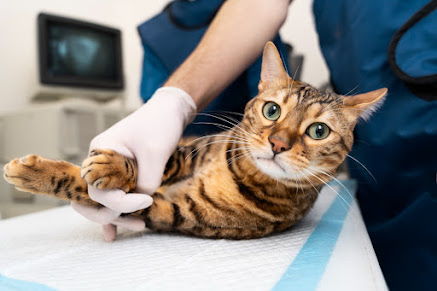How to Keep Your Cat's Skin Healthy and Prevent Hot Spots?
What are hot spots?
Hot spots are a common skin condition in cats that can be caused by a variety of factors, including allergies, parasites, and infections. They are characterized by red, inflamed, and moist patches of skin that can be painful and itchy for your cat. If you think your cat may have a hot spot, it is important to see a veterinarian as soon as possible for diagnosis and treatment.
Hot spots are a type of acute moist dermatitis. This means that they are a skin infection that results from moisture and bacteria. The moisture is caused by the cat's excessive licking, scratching, or biting of the affected area. The bacteria that normally live on the skin can then multiply and cause an infection.
What are the symptoms of hot spots in cats?
The most common symptoms of hot spots in cats include:
- Red, inflamed, and moist skin
- Hair loss
- Matted fur
- Swelling
- Pain
- Itching
What are the causes of hot spots in cats?
There are a number of factors that can cause hot spots in cats, including:
Allergies: Allergies to food, fleas, pollen, or other allergens can cause your cat to scratch or lick excessively, which can lead to the development of hot spots.
Parasites: Fleas, mites, and other parasites can also cause skin irritation that can lead to hot spots.
Infections: Bacterial or yeast infections can also cause hot spots.
Skin injuries: Any type of skin injury, such as a cut or scrape, can increase the risk of developing a hot spot.
Stress: Stress can also trigger hot spots in some cats.
How are hot spots diagnosed?
Your veterinarian will typically diagnose hot spots based on your cat's symptoms and a physical examination. They may also take a skin scraping to look for bacteria or yeast.
How are hot spots treated in cats?
The treatment for hot spots will vary depending on the severity of the infection. In mild cases, your veterinarian may prescribe a topical ointment or cream to help clear up the infection. In more severe cases, your cat may need oral antibiotics or anti-inflammatory medication. In some cases, your veterinarian may also recommend that you keep your cat in an Elizabethan collar to prevent them from further scratching or licking the affected area.
How can I prevent hot spots in my cat?
There are a number of things you can do to help prevent hot spots in your cat, including:
- Keep your cat's skin clean and free of parasites.
- Treat any underlying allergies or infections.
- Manage stress levels in your cat.
- Trim your cat's nails regularly.
- Provide your cat with plenty of scratching posts and toys.
If you think your cat may have a hot spot, it is important to see a veterinarian as soon as possible for diagnosis and treatment. Hot spots can be painful and itchy for your cat, and they can also lead to more serious infections if they are not treated promptly.
Here are some additional tips for preventing and treating hot spots in cats:
- Keep your cat's environment clean and free of allergens.
- Bathe your cat regularly with a mild shampoo.
- Use a flea and tick preventive medication.
- Avoid using harsh soaps or detergents on your cat's skin.
- If your cat does develop a hot spot, apply a cool compress to the affected area.
- Do not use human medications on your cat without first consulting with your veterinarian.
- Keep your cat's nails trimmed short.
- Provide your cat with plenty of scratching posts and toys.
By following these tips, you can help keep your cat's skin healthy and prevent the development of hot spots.






